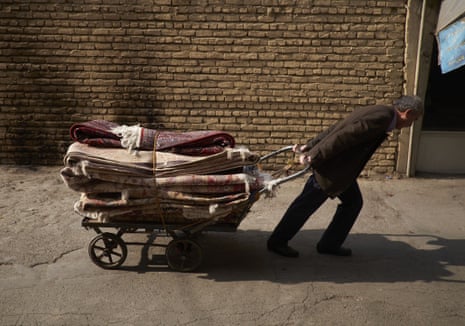“When the world sneezes, we get cancer.” In the south Tehran neighborhood of Tir Dogholoo, beauty shop owner Hojat uses this idiom to describe the Iranian economy, which has taken yet another hit in recent weeks due to a dive in global oil prices. Struggling to curb inflation and stymie the impact of international sanctions, Hassan Rouhani’s government must now deal with a 50% drop in oil revenues while selling its austerity program to a grumbling and disenchanted public.
“They’ve made fools of us,” says Hojat. “They’re telling us to prepare for hardship, so that when it happens they can tell us ‘don’t say we didn’t tell you so.’ Not that we’re in a great situation to start with. That’s what happens in a country whose government is entirely dependent on oil money.”
The nosedive in global crude oil prices to around $50 a barrel places additional strain on next year’s state budget, which reckoned with a projected rate of $72 per barrel. The budget for this fiscal year, which ends in March, assumes a rate of $100 per barrel. While the general population has yet to feel the impact of the resulting spending cuts, it makes for foreboding news at the currency bazaars as well as supermarkets.
Stabilized at around 32,000 Rial as of mid-November, dollar prices have seen a steady increase on Tehran’s free currency market since early December, when they peaked at 36,000 Rial. Meanwhile, households are facing month-to-month increases in the prices of essentials like bread and medicine. Eshagh Jahangiri, Rouhani’s first deputy, recently admitted that the government had failed to properly communicate what impact the low oil prices will have on the nation’s economic policy and on people’s lives.
“One sees the prices climbing and starts to protest,” says Emad, 35, a doctor at a pharmacy in the Yousuf Abad neighborhood in central Tehran. “What happened to Rouhani’s promises that medicine would get cheaper and inflation would be controlled? One understands less about the sudden oil price drop and attributes everything to incompetence and theft, thinking that Rouhani is just a continuation of the previous president.”
Mariam, 57, a housewife shopping for groceries at a supermarket in Karim Khan, notes that the price of pasta and oranges has increased by at least 20% in recent weeks. “What’s it to me if oil prices have gone down? They always come up with some excuse...I swear to God the situation has not changed since the Ahmadinejad era.”
Among members of the business community, a common sentiment has been to blame the oil price drop on Saudi Arabia, often portrayed in newspaper headlines as Iran’s regional arch nemesis. “It’s clear that the Saudis and the Emiratis are behind it,” says Jafar, who runs an automobile showroom near the Sadr bridge on north Tehran’s Shariati Street. “They know that Rouhani and [US President Barack] Obama are getting close, and that Iran is poised to become the United States’ main ally in the region. That’s why they’re trying to sink Iran this year...We have to show the Saudis that we’re not messing around, for example by cutting diplomatic relations.”
Asmin, a 33-year-old economist and bank employee, made another suggestion: If the government isn’t able to reach a nuclear agreement with the west and lift international sanctions, it should reform its cash subsidy program for the poor, which is being exploited by applicants who don’t need the money. “We’re talking about five to ten million people,” she says. “This would help the government save on expenses.”
While the general debate regarding their awaited impact abounds with cynicism, it has been fruitful in at least one respect: Whether they end up impacting social welfare programs or lead to increased tax collection, the low oil prices are generating a public discussion on the need to diversify state revenue streams.
“In the long term, we have to do some serious thinking,” says Jafar. “How long can the economy of the country revolve around oil prices? And what happens when we run out of oil one day? In either case, the money just goes into the hands of regime types. It doesn’t go into the hands of the people. Only the hardships and the high prices are ours to have.”

Comments (…)
Sign in or create your Guardian account to join the discussion